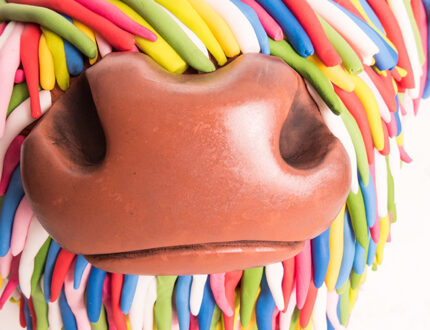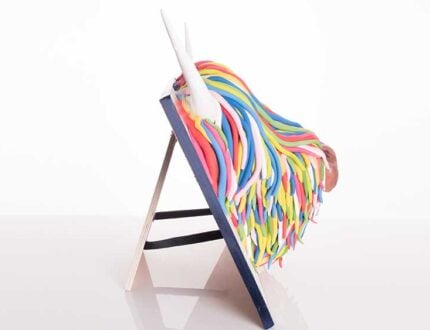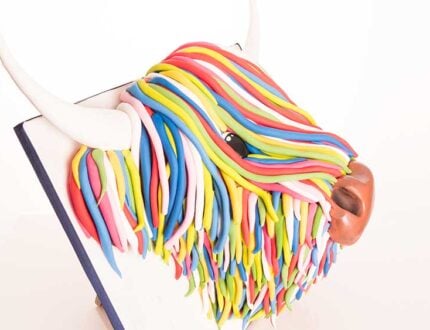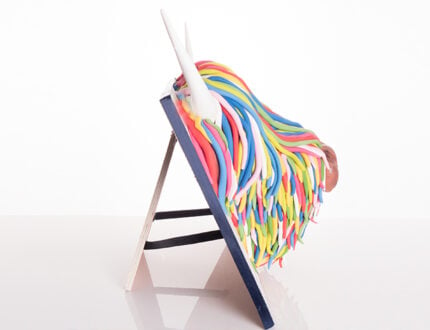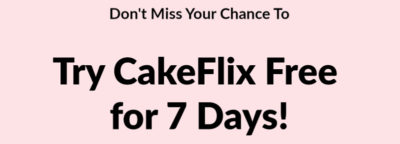Tutorial Preview
1. Preparing the board and stand
The stand is a huge part in this cake for the overall design so in this lesson Paul talks you through the structure and requirements of the stand. This design has been inspired by Steven Brown Art.
2. Putting the board and stand together
How does it all come together? When you see the finished cake this is the question that you want your customers asking. In this lesson Paul starts to put the stand together bit by bit. It’s more DIY than cake designer, but the two are now inextricably linked.
3. Finishing the board and stand
Making sure the stand is strong and secure is crucial to ensuring this design works so watch Paul putting the final structure together.
4. Carving and Ganaching
Time to get the cake out and carve to the shape of the Highland Coo’s head. Paul takes you through slice by slice until you get the shape you need to get ready for the decorating.
5. Covering the cake
This requires one very large piece of sugarpaste, but not as daunting as it might seem. Watch how Paul rolls the sugarpaste then covers and moulds the paste to begin to show the coo’s facial features.
6. Icing the board
An iced board always gives a much better finish so here Paul shows how to ice the board for an unusual shape.
7. Adding the muzzle
The Highland cow has a distinctive muzzle so watch how Paul moulds the sugarpaste to get the desired shape.
8. Adding the ears and painting the eyes
In this lesson, Paul adds the ears and paints the eyes.
9. Adding the horns
Horns are another distinctive feature of the Highland coo so in this Lesson, Paul shows you how to shape flower paste and stick to the head.
10. Preparing the coloured fur
You might need your sunglasses for this part as Paul rolls out some very striking colours in preparation for adding the fur.
Note: Paul starts to texturise the fur but later decides that it looks better rolling the fur to a point.
11. Adding the long strands of fur
Now that the decoration is coming together in this lesson Paul starts to add the longer strands of fur and gives it a very bushy colourful look.
12. Finishing the fur
As always with repetitive decoration you need to take time to stand back and review. Paul spots a few gaps and areas where needs to add some further decoration just to finish it off.
13. Finishing touches
With a little dusting and glazing, Paul adds the magical finishing touches.
14. Other ideas
Paul looks at some other ideas you can make with this design.
15. Lesson-15-Pro-Lesson
Paul shares with you all the information a professional cake decorator would need to know for this design. Including cost, time and pricing.
16. Highlights
We look at some of the highlights from this tutorial.
Join Paul for this colourful highland cow cake…
In this week’s tutorial, Paul shows us how to make this eye-catching highland cow cake, inspired by the Scottish artist Steven Brown.
Originally made for Paul’s Dad and his friend to donate towards Prostate Cancer UK. It uniquely ended up in the hands of the man who inspired it, Steven Brown, for his 21st birthday (or so he tells us).
Steven kindly donated a generous sum of money to prostate cancer UK for the cake which Tom (Paul’s Dad) was ecstatic with. You can find out more about this story here.
In this tutorial, you will learn how to…
- Create coloured highland cow cake fur
- Ice a board
- Carve and ganache
- Create and put a board and stand together
- and much, much more
Don’t forget to share your interpretations of this wonderful cake with Paul and rest of the Sugarcraft community on our Facebook group.
Who knows? You may even end up featured in one of our monthly members’ cake blogs.
Background
The Highland cow, also known as the Highland hairy coo, is a breed of cattle indigenous to the Scottish Highlands and Outer Hebrides. It is known for its long, shaggy hair that often covers its face, giving it a distinctive appearance.
Highland cows are a hardy breed and well-suited to the harsh climate of the Scottish Highlands. They have a thick, double coat that insulates them from the cold and wet weather. They also have long horns that can be used for defense against predators.
Highland cows typically have a dark brown or black coat, but they can also be found in a variety of other colors, including red, yellow, and white. They are a relatively large breed, with bulls weighing up to 2,000 pounds and cows weighing up to 1,200 pounds.
Highland cows are known for their gentle and docile temperament. They are also very intelligent and easy to train. They are a popular breed for both beef and milk production, and their meat is known for its rich flavor.
In addition to their practical uses, Highland cows are also a popular tourist attraction. They are often seen grazing in the fields of the Scottish Highlands, and visitors can often get close to them for a photo opportunity.
Here are some additional facts about Highland cows:
- They can live for up to 20 years.
- They typically give birth to one calf per year.
- They are a social breed and live in herds.
- They are good swimmers and can cross rivers and lakes.
- They are a symbol of Scotland and are often used in advertising and marketing campaigns.
